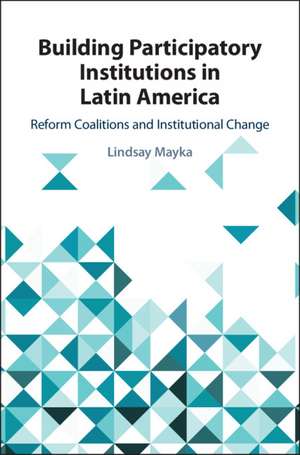Building Participatory Institutions in Latin America: Reform Coalitions and Institutional Change
Autor Lindsay Maykaen Limba Engleză Hardback – 6 feb 2019
| Toate formatele și edițiile | Preț | Express |
|---|---|---|
| Paperback (1) | 284.97 lei 6-8 săpt. | |
| Cambridge University Press – 21 iul 2021 | 284.97 lei 6-8 săpt. | |
| Hardback (1) | 627.20 lei 3-5 săpt. | +23.81 lei 5-11 zile |
| Cambridge University Press – 6 feb 2019 | 627.20 lei 3-5 săpt. | +23.81 lei 5-11 zile |
Preț: 627.20 lei
Preț vechi: 689.23 lei
-9% Nou
Puncte Express: 941
Preț estimativ în valută:
120.12€ • 123.76$ • 100.62£
120.12€ • 123.76$ • 100.62£
Carte disponibilă
Livrare economică 03-17 februarie
Livrare express 18-24 ianuarie pentru 33.80 lei
Preluare comenzi: 021 569.72.76
Specificații
ISBN-13: 9781108470872
ISBN-10: 1108470874
Pagini: 320
Ilustrații: 14 b/w illus.
Dimensiuni: 157 x 235 x 21 mm
Greutate: 0.54 kg
Editura: Cambridge University Press
Colecția Cambridge University Press
Locul publicării:New York, United States
ISBN-10: 1108470874
Pagini: 320
Ilustrații: 14 b/w illus.
Dimensiuni: 157 x 235 x 21 mm
Greutate: 0.54 kg
Editura: Cambridge University Press
Colecția Cambridge University Press
Locul publicării:New York, United States
Cuprins
1. Introduction: the puzzle of participatory institution building; 2. Theoretical framework: participatory institution building through sweeping sectoral reform and policy entrepreneurs; 3. The origins of participatory reforms in Brazil and Colombia; 4. Brazil's health councils: successful institution building through sweeping reform; 5. Brazil's social assistance councils: the advances of a broad but divided coalition mobilized through sweeping reform; 6. Colombia's planning councils: the limits to participatory institution building without sweeping sectoral reform; 7. Colombia's health committees: failed participatory institution building in the absence of policy entrepreneurs; 8. Lessons for institutional change, interest representation, and accountability.
Recenzii
'Mayka's book is a gem. It provides an original conceptualization and argument for the process of institutional strengthening of participatory innovations. In her carefully crafted and thoroughly researched comparison of participatory institutions in the public policy sectors of health, social assistance, and planning in Brazil and Colombia, Mayka reveals the importance of originating sweeping reforms and policy entrepreneurs that can activate broad coalitions. This book is a must read for anyone interested in institutional creation and change, civic participation, health, social assistance, and the recent institutional innovations and politics of Latin America.' Tulia Falleti, Director of the Latin American and Latino Studies Program, University of Pennsylvania.
'Latin America played an innovative role in the global diffusion of participatory reforms in recent decades, but as Lindsay Mayka shows in this insightful book, these reforms varied widely in their effectiveness and levels of grass-roots engagement. This book is a must-read for scholars and policymakers alike who want to understand the larger institutional environments that make popular participation meaningful, inclusive, and responsive to citizens at the grass-roots.' Kenneth Roberts, Cornell University, New York
'Latin America played an innovative role in the global diffusion of participatory reforms in recent decades, but as Lindsay Mayka shows in this insightful book, these reforms varied widely in their effectiveness and levels of grass-roots engagement. This book is a must-read for scholars and policymakers alike who want to understand the larger institutional environments that make popular participation meaningful, inclusive, and responsive to citizens at the grass-roots.' Kenneth Roberts, Cornell University, New York
Notă biografică
Descriere
Explains how and why some national mandates for participatory policymaking develop into powerful institutions for citizen engagement.
